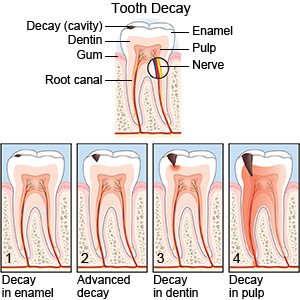Dental Cavities
Medically reviewed by Drugs.com. Last updated on Sep 23, 2025.
AMBULATORY CARE:
Dental cavities
, also called caries, are holes in teeth caused by bacteria. The bacteria mix with carbohydrates from foods and create acids. The acids break down areas of enamel, which covers the outside of a tooth.
 |
Common signs and symptoms:
You may not have any symptoms if cavities have just started to form. When cavities reach deeper parts of your tooth, you may start to feel pain. You may also have any of the following:
- Pain when you chew or eat hot or cold foods
- Chalky white, yellow, or brown tooth
- Gum swelling
Seek care immediately if:
- You have severe pain in your tooth or jaw.
- You have swelling in your jaw or cheek.
Call your dentist if:
- You have a fever.
- Your tooth pain gets worse.
- You have questions or concerns about your condition or care.
Treatment for dental cavities
may include any of the following:
- A fluoride treatment may be given during dental visits, or you may use products with fluoride at home. Your dentist will tell you what kind of fluoride you need and how to use it.
- A filling may be placed in your tooth after the decayed portion is removed. The filling may help to protect your tooth from more decay.
- A root canal may be needed if the tooth is infected or the decay is severe.
Prevent dental cavities:
- Brush your teeth at least 2 times a day with fluoride toothpaste.
- Use dental floss at least once a day to clean between your teeth.
- See your dentist every 6 months for dental cleanings and oral exams.
- Rinse your mouth with water or mouthwash after meals and snacks. Chew sugarless gum.
- Eat a variety of healthy foods. Healthy foods include fruits, vegetables, whole-grain breads, low-fat dairy products, beans, lean meats, and fish. Avoid sugary and starchy food and drinks that can stick between your teeth.

Follow up with your dentist as directed:
Write down your questions so you remember to ask them during your visits.
© Copyright Merative 2025 Information is for End User's use only and may not be sold, redistributed or otherwise used for commercial purposes.
The above information is an educational aid only. It is not intended as medical advice for individual conditions or treatments. Talk to your doctor, nurse or pharmacist before following any medical regimen to see if it is safe and effective for you.
Learn more about Dental Cavities
Care guides
Further information
Always consult your healthcare provider to ensure the information displayed on this page applies to your personal circumstances.
